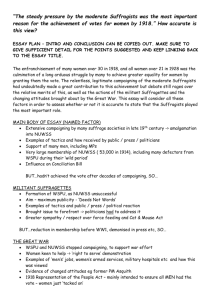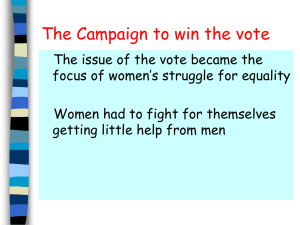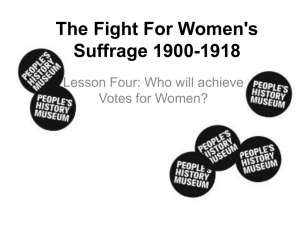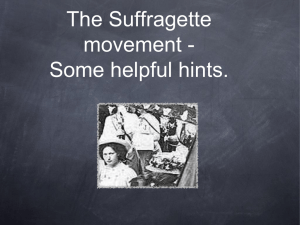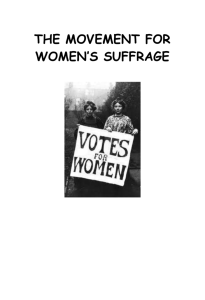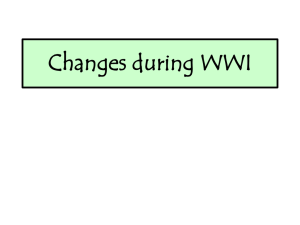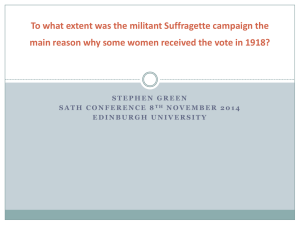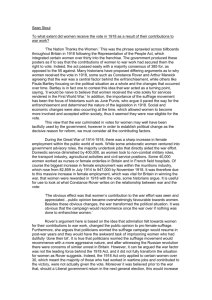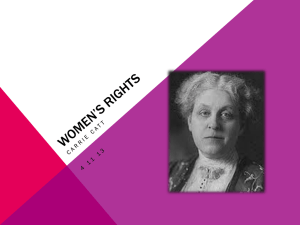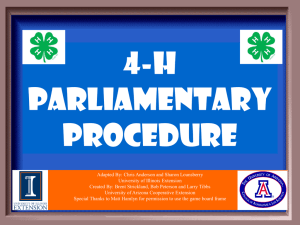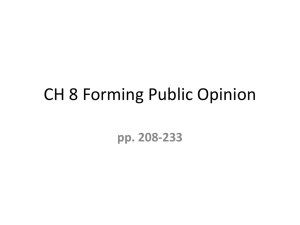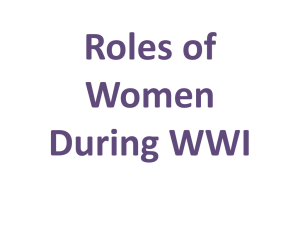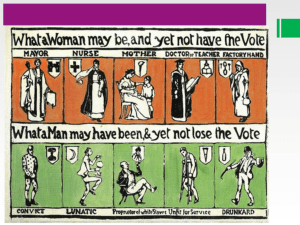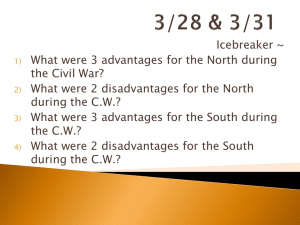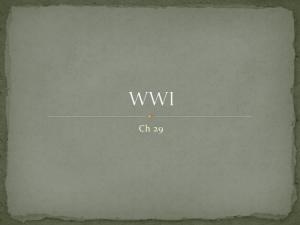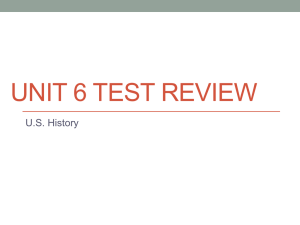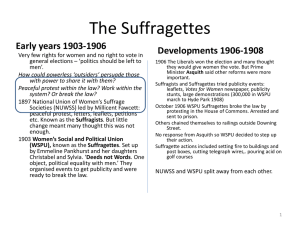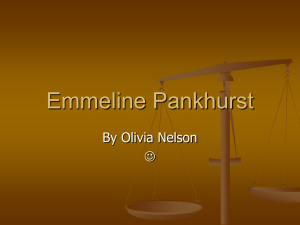WOMEN - INTRO - historyatplockton
advertisement
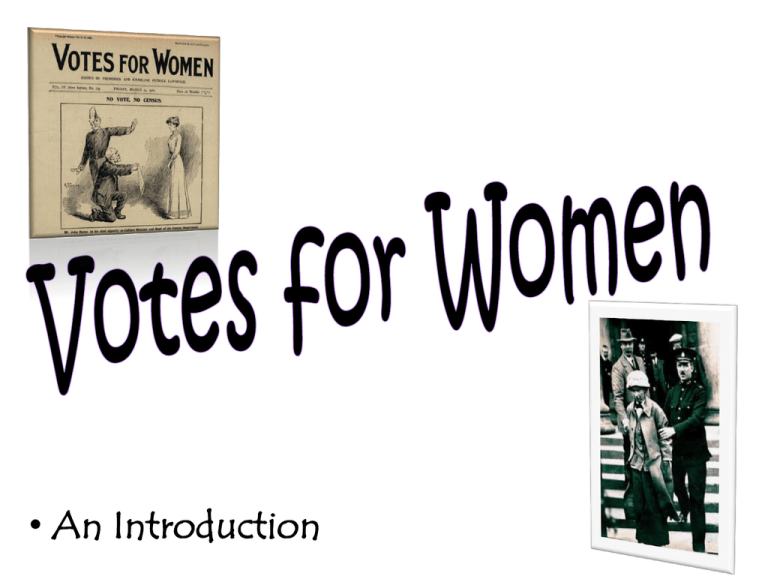
• An Introduction February 6th 1918 The Representation of the People Act decreed: All women over 30 who were married to property owners or who owned property themselves were allowed to vote in parliamentary elections. This enfranchised 8 million women The "true woman" was pure, delicate, frail and passive. Women too emotional to deal with political issues. Women were the Angel in the Home! Public beliefs of the time Men saw themselves as the dominators of the Public Sphere- that is the place of work and politics. Women’s brains smaller than men’s! Women did not fight for their country so didn’t deserve the vote! The Corset personified the restrictions faced by women in the early 20th century! Suffragists and Suffragettes SUFRAGISTS (NUWSS) Origin: 1897 – First UK Suffrage Group NUWSS brought together women’s suffrage societies from all over Britain into one large organisation. Millicent Fawcett Organisation: • Broad based • Included a wide range of opinions – male supporters. • Radical Suffragists – attempted to win working class support. Suffragists: Overview o The FIRST and BIGGEST women’s suffrage movement. o Regarded as most SUCCESSFUL. o NUWSS numbers grew considerably and was far bigger than the WSPU (Suffragettes). o NUWSS – 1907: 6,000 members 1913: 50,000 members Peaceful Methods: o Meetings o Pamphlets o Newspaper articles EXAMPLE Suffragist Pilgrimage, 1913: Held Pilgrimage to Hyde Park to show govt. they had support for vote. On 26th July, around 50,000 women reached Hyde Park. Suffragettes (WSPU) Origin 1903 – Emmeline Pankhurst broke away from the NUWSS to form the WSPU. Emmeline Pankhurst Organisation • Narrowly based • Dedicated to one aim – no male members – no interest in other issues. Suffragettes: Overview Methods: • Motto = “Deeds not Words” • 1905-1908: Campaign of disruption of political meetings, heckling politicians, large parades, chalking slogans on streets etc. • 1909-1914: Increasingly violent – smashing windows, pepper bombs, setting fire to pillar boxes etc. Main aim of a Higher Essay… Analysis This ultimately means: • The degree to which you show a line of argument throughout the essay • The way in which you use evidence • The way in which you answer the question Types of Questions • “It was the militant suffragette campaign, more than any other factor, that led to the achievement of female suffrage in 1918.” How valid is this view? • “Their contribution during World War I was the main reason why the majority of women gained the right to vote in 1918.” How valid is this view? • “The steady pressure by the moderate Suffragists was the most important reason for the achievement of votes for women by 1918.” How accurate is this view? • “Changing attitudes in British society towards women was the major reason why some women received the vote in 1918.” How accurate is this view? Our focus… “Their contribution during W.W.I was the main reason why the majority of women gained the right to vote in 1918” How valid is this view? These are your factors Would we get the same result if one of these ‘ingredients’ were missing? Did we need all these ‘ingredients’? Miss MacKay’s Recipe for Female Suffrage: Would women have got the vote sooner without any of these ingredients? Increasing political equality Think about the degree to which each contributed… Women’s war work Work of the suffragists Work of the suffragettes Changes during WWI There are two main schools of historical thought regarding WHY some women were granted the vote in 1918. Traditional School of Thought… WWI was most important in gaining women the vote because they “proved by their work that they deserved the vote. Thus their war efforts succeeded where the Suffrage campaign failed.” (John Ray) Revisionist School of Thought… Historians such as Pugh argue that WWI was the most important factor is too simplistic for many reasons. Suggesting that there were other contributing factors. Suffragette militant tactics were the main reason for women gaining the vote because they revitalised the campaign by gaining publicity which put pressure on the government. Without the peaceful suffragists, women would not have gained the vote in 1918. The Suffragists were influential in gaining the support of many MPs. The position of women in society was constantly improving after 1850, the vote was just a logical progression of this. Women were gaining more political and educational equality with men. WWI was the most important factor in granting women the vote in 1918 because it removed the argument that women did not deserve the vote because they didn’t serve for their country in times of war. The changes which took place during WWI such as the changes in government were important to women securing the vote because it removed anti-suffrage MPs from power. Main arguments regarding why some women got the vote in 1918. Impact of WWI Mrs Pankhurst suspended all campaigning in order to fully support the war effort. During WWI, women filled the place of men by taking on jobs previously dominated by men. Impact of WWI Mrs Pankhurst suspended all campaigning in order to fully support the war effort. During WWI, women filled the place of men by taking on jobs previously dominated by men. Changing Attitudes • Newspapers called women workers “heroines”. • “The Nation Thanks The Women” posters went up all over Britain • Some politicians (incl. Asquith) found themselves influenced by the change in public opinion Changing Opinions Asquith was PM from 1906-16. The WSPU hated him before WW1. In 1918 even he said “How could we have fought and won the war without them ?” Contribution to WWI You will be reading through two views of the importance of women’s contribution to WWI to enfranchisement in order to gain evidence and analysis to support both of the following statements. 1. 2. Contribution to WWI did lead to women gaining the vote Contribution to WWI was not the main reason for women gaining the vote. Create two columns: • Evidence (Knowledge) • Analysis st 1 one together… Certainly, there is evidence to suggest that the hard work completed by the 7 million women during WWI improved the attitudes towards them. Posters and newspaper cartoons, such as those by Septimus Scott echoed the feelings of the country by carrying messages such as ‘These women are doing their bit.’ This was important because it removed the argument that women had not fought for their country and also encouraged the public to acknowledge women for their hard work. Evidence Analysis 7 million women during WWI improved the attitudes towards them. Posters and newspaper cartoons, such as those by Septimus Scott echoed the feelings of the country by carrying messages such as ‘These women are doing their bit.’ This was important because it removed the argument that women had not fought for their country and also encouraged the public to acknowledge women for their hard work. Copy & Complete The traditional view of historians is that women proved by their contribution to the war effort that they deserved the vote. Certainly there is evidence to suggest that their contribution altered views towards them [INSERT EVIDENCE]. Indeed, this was important because [INSERT ANALYSIS] HIGHER HOMEWORK 1 • Copy the diagram on pp. 147 (into homework jotter!) • Add more details to the areas of work e.g. dates, number of women, type of work done. • Due: Friday 7th June.
